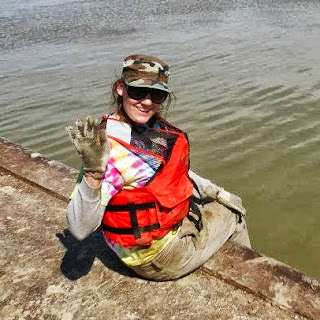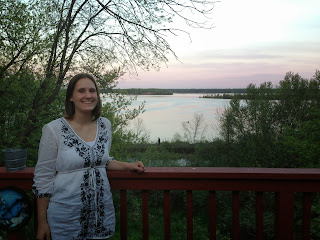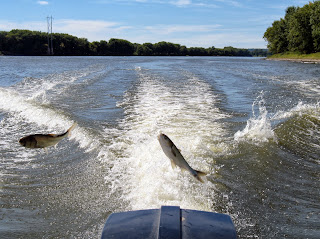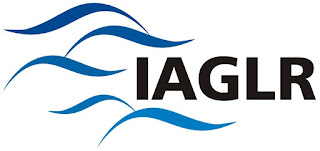During my IISG internship, I worked with Paris Collngsworth on a study comparing zooplankton and nutrient data collected by the Great Lakes National Program Office (GLNPO) with data collected by the Interagency Lower Trophic Level Monitoring Program of the Lake Erie Committee Forage Task Group (LEC-FTG). We used a mathematical model to calculate the similarities in zooplankton communities across time and locations. This study will help improve monitoring efforts by determining whether the LEC-FTG survey is capturing characteristics that the GLNPO data is not.
Category:
Former intern Meredith expands her environmental work into outreach
July 8th, 2014 by iisg_superadminFormer intern Sahana Rao takes Sea Grant experience to environmental law studies
July 1st, 2014 by iisg_superadmin To celebrate the program’s two-year anniversary, we go back to where it all began with a four-part series showcasing our first round of interns—what they did and where they are now. Our second interview is with Sahana Rao.
To celebrate the program’s two-year anniversary, we go back to where it all began with a four-part series showcasing our first round of interns—what they did and where they are now. Our second interview is with Sahana Rao. Do it! IISG internships are a great opportunity to not only expand your knowledge of environmental issues in the Midwest but also to develop essential skills like researching and writing for a variety of audiences. You get to work with and learn from highly qualified folks in really cool settings—whether you’re in downtown Chicago or on a boat on one of the Great Lakes.
Former intern Lainey continues environmental education and hands-on work
June 25th, 2014 by iisg_superadmin
I worked with the aquatic invasive species (AIS) team at the Chicago Botanic Gardens. I designed and conducted a survey to help investigate the prevalence of AIS preventative behaviors among boaters and anglers, a key demographic in the effort to prevent the spread of AIS. By the end of the summer, I formulated a formal research report and academic poster presentation based on the final results of my survey. All efforts in the research and poster presentation were done in collaboration with my internship supervisor and co-author, Sarah Zack. In September 2012, I presented my research at the Illinois Water Conference at the University of Illinois and received a student scholarship and honorable mention award. Among the 30 registered students in the poster competition, I was one of two to receive a conference award and the only undergraduate to receive any mention.
Intern Allison spends some of her summer internship on-board a research vessel
October 22nd, 2013 by Irene Miles
“As an indecisive, undeclared sophomore I enrolled in a course titled Environmental Sustainability. Though I registered with low expectations, I found myself completely captivated by the readings and discussions we had in class. By the end of the semester I knew environmental sustainability was a passion I wanted to pursue, and I declared a major in Earth, Society, and the Environment. I also added a Geography and GIS Major and Business Minor along the way. Studying and working in these fields has afforded me the opportunity to engage in a wide range of academic and extracurricular experiences that have truly shaped my outlook on the world and secured my commitment to responsibly addressing environmental issues.
My internship with the Illinois-Indiana Sea Grant this summer has been the most rewarding experience of my collegiate career thus far. As the Great Lakes Education Intern I worked under the leadership of my mentor Kristin TePas to develop a website for the U.S. EPA research vessel Lake Guardian that effectively communicates the ship’s research and educational activities to the general public. The Lake Guardian is a unique and extremely valuable resource that has facilitated Great Lakes research for over 25 years, which in turn promotes better understanding and awareness of environmental issues affecting the lakes.
Kristin and I, through the creation of a user friendly Lake Guardian website, hope to expose teachers, students, and the general public to current Great Lakes research projects and inspire communication between scientists and their communities. By interviewing our target audience we determined what people wanted to see on the website and then developed some of the items they requested, including a ship specifications chart, science equipment videos, an ‘Ask a Scientist’ form, FAQ page, Science and Marine Career videos, as well as a YouTube channel and Flickr gallery to give a sense of life and work on the ship. The overarching goal is for the Lake Guardian site to be a fun and engaging way to compel people to be invested in the health and vitality of the Great Lakes.
My experiences this summer have opened my eyes to the importance of protecting the Great Lakes, which had not previously been in the forefront of my environmental concerns. Even growing up in Chicago I took Lake Michigan for granted because I did not understand how fragile the Great Lakes ecosystem truly is, or how critical the Lakes are to people’s livelihoods. Increasing awareness is vital to conserving the Great Lakes, and my position with Illinois-Indiana Sea Grant this summer gave me great exposure to environmental outreach. I have thoroughly enjoyed my work, especially all the valuable input I received from an assortment of teachers, scientists, Lake Guardian crew, and Sea Grant staff. This internship has been an excellent growing experience for me. I have vastly improved my communication, planning, and organizing skills as well as enhanced my understanding of the Great Lakes.”
Allison is one of four interns who worked with IISG this summer.
Recent grad gets hands-on experience with social science through IISG summer internship
October 18th, 2013 by Irene Miles“This summer I interned with Illinois-Indiana Sea Grant as the Human Dimensions of Natural Resources Intern. When I found the listing for the IISG Internship position I knew right away it was right for me. I was ecstatic to find a position that aligned with my interests in both psychology and environmental science, so I excitedly submitted my application and then waited nervously. Days after I walked across the stage as a 2013 graduate from Northern Illinois University, I relocated from DeKalb, Illinois to my new office on the University of Illinois’ campus.
Throughout the summer I traveled around the Great Lakes with my mentor Caitie McCoy and collected data on people’s perceptions of contaminated sediments. One of Sea Grant’s missions is to conduct research across the Great Lakes; as such, my job was to assist Caitie in conducting a study on two contaminated rivers slated for cleanup. In order to restore the health of the Great Lakes ecosystem and restore benefits to the local communities, the GLLA funds sediment remediation and habitat restoration in connecting waterways. The purpose of our research was to gain an understanding of how people in these communities relate to their river so that this information could be used to guide outreach efforts at these and other contaminated sites. We were also interested in the different benefits that communities receive from these waterways and how cleanup efforts might enhance those resources. In order to get a site-specific understanding we traveled to different locations and interviewed local leaders.After learning about the background and purpose of the GLLA program, my first task was to recruit interview participants. I am rather shy normally, but conducting the recruitment communications and helping with the interviews was a great experience to break me out of my shell. I was pretty nervous during my first recruitment call, but after speaking with an extremely nice and generous person who invited us to go fishing during our interview I became much more comfortable. With help from our local outreach teams, we ended up with nearly 45 interviewees between our two sites (Duluth, MN and Sheboygan, WI).I really love to travel, see new places, and learn new things so I have to say conducting the interviews was my favorite part of the internship. Both cities were beautiful in their unique way, and I’d definitely visit again if I got the chance. (In fact I’d consider living in Duluth despite an average of 80 inches of snowfall per year.) It was so interesting to get to listen to people’s stories and learn about the environmental issues in the Midwest. After the site visit I got right to work at transcribing the interviews which I will admit was not my favorite part of the experience but was a very valuable task and an opportunity to develop a new skill.Before this internship most of the research I had been involved in was quantitative so the idea of data analysis guided by intuition was sort of foreign to me. At first I stumbled through the process but I found conceptual ground and eventually was able to enjoy qualitative analysis. Because of my concern for the health of the environment and my interest in social science it really gives me a great feeling to know that research like this is being conducted. In the end I feel accomplished; the study I helped with this summer will guide future outreach at the sites we visited and add to our understanding of the benefits of river cleanups. And ultimately that will help prove the real-world value and impact of programs like GLLA. This internship reaffirmed my passion for research and exposed me to a multitude of career options that are directly in line with my interests. I leave this position with a little more direction and a lot more hope for the future of the Great Lakes.”
Summer intern works on getting the word out about waste reduction
October 10th, 2013 by Irene MilesJohn Saltanovitz, currently a senior at Purdue earning a bachelor’s degree in Natural Resources and Environmental Science, worked this past summer as a sustainable communities outreach intern with IISG’s Kara Salazar. He wrote in to detail his experience getting hands-on in the environmental science field.
“When I started college, I was not aiming towards a career in environmental science. But as my classes progressed and I learned more about the topics, I realized how important the field was. There are so many issues that, if left ignored, could cause problems for future generations. Working to solve these problems is why I chose environmental science as my major. I learned about the internship with IISG from an email my department sent out, and it seemed like an amazing opportunity to get hands-on with the field I wanted to be involved in.
My specific focus was with community outreach. I worked with Kara on creating publications that could help communities be more aware of environmental problems and how to fix them. My main project was creating a zero waste guide that could be used for planning local events in the future. The guide helps to provide ideas and statistics behind zero waste events, how they work, and how to plan for them. My hope is that this document will encourage people in the community to work towards being more environmentally friendly.My work this summer has showed me how much effort those in the outreach field put forth to help make a difference. I’ve always grown up around the Great Lakes, but this internship really opened my eyes to all of the different projects people are doing to assist and protect the Great Lakes region. Before this internship, the idea of research/outreach with the Great Lakes hadn’t crossed my mind, but this summer’s experiences have greatly increased my interest in and passion for the subject. I’ve learned that no problem is too small or unimportant when it comes to creating a better place to live and a healthier environment.I plan on continuing my studies in environmental science and working towards a degree in environmental engineering. My internship showed me how many possibilities are out there and what can be accomplished with hard work. I’ve met so many great people through IISG who all have a passion for what they do. It was a blessing to be involved in an organization like IISG. The only downside is that the summer felt like it went by so fast. I wish that I could have had more time to continue working and networking in the field.”
Sea Grant intern gets the word out about invasive species this summer
October 3rd, 2013 by Irene Miles“I’ve always had a love for being outdoors. Several family members of mine work in the environmental field, so that helped spark my interest in biology and environmental science. A relative of mine mentioned the IISG internship program to me last summer, but I was away at school and unavailable. I was very thankful that this internship was offered again this year as I finally got the chance to get involved with Sea Grant.
I worked with the Aquatic Invasive Species Outreach Team in Glencoe, IL. Specifically I worked with fishing tournament anglers and organizers, helping that group prevent the spread of aquatic invasive species. Anglers are a large and crucial audience when trying to reach recreational water users, as they are dependent on healthy water for fishing. However, little information was available on this audience and what they do in terms of AIS prevention. I conducted a survey with tournament organizers to better understand what their role was in AIS prevention, and I attended several fishing tournaments throughout the summer to conduct public outreach.
I’ve gained so much more experience with public outreach and education through this internship. Going to events throughout the summer has provided me with experience explaining complex environmental issues to the public. I’ve always had an interest in ecology, but this internship has really fueled an interest in aquatic ecology, especially in the Great Lakes region. The Great Lakes are an important natural resource for us, and my internship gave me an opportunity to help protect the Lakes in a meaningful way.
At this point, I want to continue working in the environmental field before going back to school for any graduate work. At the moment, I’ve just been hired to continue with IISG as an outreach assistant. I’m obviously extremely excited to stay on board with the AIS team and continue working with recreational water users as well as other audiences critical to preventing the spread of these species.”
Sustainable communities intern helps Indiana protect natural resources
July 31st, 2013 by Irene Miles As summer begins to wind down, so do IISG’s summer internships. For John Saltanovitz, though, working as an intern at Purdue University’s Sustainable Communities Extension Program is just the beginning. With a summer full of hands-on outreach experience under his belt, John plans to pursue a career as an environmental engineer so he can continue to help communities and organizations better use and conserve natural resources.
As summer begins to wind down, so do IISG’s summer internships. For John Saltanovitz, though, working as an intern at Purdue University’s Sustainable Communities Extension Program is just the beginning. With a summer full of hands-on outreach experience under his belt, John plans to pursue a career as an environmental engineer so he can continue to help communities and organizations better use and conserve natural resources. IISG interns relate their IAGLR 2013 experiences
June 10th, 2013 by Irene MilesThree of IISG’s interns were among the hundreds of scientists, researchers, educators, and more in attendance at last week’s IAGLR 2013 conference. Each of them wrote in to tell us more about their experiences at the conference, and some interesting things they took away from the sessions.
Recent News
- Coastal communities can tap into IISG resources as they manage beach sand and structures
- It’s time to apply for the 2026 IISG Graduate Scholars Program
- IISG’s Eliana Brown wins 2025 Illinois Extension Excellence Award
- We’re hiring eight interns for summer 2026
- In 2026, IISG intends to fund 10 research projects focused on coastal concerns
IISG Instagram
Graduate students: don’t miss your chance to advance your research and expand your professional network! The 2026 Illinois-Indiana Sea Grant Graduate Scholars Program is now open for applications. Whether your work focuses on coastal resiliency, Great Lakes science, water resources, or community engagement, this opportunity offers funding and professional development to support your graduate research. Learn more and apply today — opportunities like this don’t come every year!
👉 Read the full details at the link in bio.

Join us next month at the Friends of the Chicago River’s Friends of the Chicago River’s annual Student Congress. We’re excited to attend this free, student-driven environmental conference where we will be leading the Great Plankton Race.
Learn about river issues, connect with peers and professionals, enjoy snacks & giveaways, and even see live animals.
Who: Open to all students, families welcome too!
Where: On the campus of Northeastern Illinois University
When: Saturday, February 28, 2026
8:30 a.m. to 1:30 p.m.
Learn more and register at the link in bio.
#TeachingTuesday #ChicagoRiver

✨ Start Your New Year with Great Lakes Learning! ✨
Kick off 2026 by exploring the Center for Great Lakes Literacy Resource Library. It’s your one-stop hub for lesson plans, activities, and tools to bring Great Lakes science into your teaching setting.
Visit the link in bio to dive in today!
#TeachingTuesday
#GreatLakes #NewYearNewResources

Join us for a hands-on Project WET Make-and-Take Workshop in Chicago!
📅 When: March 12, 2026 from 9:00 AM – 3:30 PM CT
📍 Where: 200 S Wacker Dr., Chicago, IL
💲 Cost: $25 (includes classroom-ready activity kits, lunch & refreshments)
🗓️ Registration closes February 26.
✅ Open to 3rd–8th grade formal & informal educators
✅ Earn 6 PD hours
✅ Leave with ready-to-use water education kits aligned to Common Core & NGSS
👉 Don’t miss out—space is limited!
Learn more and register at the link in bio.
@thengrrec

Categories
- Aquaculture
- Aquatic Invasive Species
- Buoys
- Climate Ready Communities
- Coastal Resilience
- Director's Blog
- Education
- Featured
- Fellowships
- Fisheries
- Funded Research
- Funding
- Great Lakes Cleanup
- Great Lakes Data
- Healthy Waters
- Internships
- Jobs
- K-12 Education
- News
- Photos
- Program
- Recreation & Tourism
- Resources
- Sea Grant Scholars
- Stormwater & Green Infrastructure
- Sustainable Community Planning
- The Helm
- Uncategorized
- Video
- Water Resource Economics





